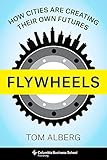Flywheels : how cities are creating their own futures / Tom Alberg, Columbia Business School Publishing.
Material type: TextPublisher: New York : Columbia University Press, [2021]Description: 1 online resource (xii, 281 pages)Content type:
TextPublisher: New York : Columbia University Press, [2021]Description: 1 online resource (xii, 281 pages)Content type: - text
- computer
- online resource
- 9780231553186
- 0231553188
- Cities and towns -- Effect of technological innovations on -- United States
- Urban renewal -- United States
- Technology -- United States -- Sociological aspects
- Villes -- Effets des innovations sur -- États-Unis
- Rénovation urbaine -- États-Unis
- Technologie -- États-Unis -- Aspect sociologique
- BUSINESS & ECONOMICS / Leadership
- Cities and towns -- Effect of technological innovations on
- Technology -- Sociological aspects
- Urban renewal
- United States
- 307.760973 23
- HT167
| Item type | Home library | Collection | Call number | Materials specified | Status | Date due | Barcode | |
|---|---|---|---|---|---|---|---|---|
 Electronic-Books
Electronic-Books
|
OPJGU Sonepat- Campus | E-Books EBSCO | Available |
Includes bibliographical references and index.
"Around the world, as cities try to solve the riddle of creating prosperous and equitable futures for more people, again and again, they find themselves competing for the Big Prize - often a tech-based corporate headquarters, data center or lab. And this does indeed work to a point -- building such places does encourage urban renewal -- but one look at skyrocketing real estate prices and homelessness in tech hubs such as Seattle and the California Bay Area show that it's not that simple. The author draws on his experience advising companies to propose a different way of looking at tech companies and urban renewal, based on the flywheel. Just as flywheels generate energy, so do tech companies energize local economies, and so do cities seek to reinvigorate themselves. While both sides have operated independently, in the future they must work in alignment with each other -- tech companies must contribute to their host cities' public infrastructure, while governments must create policies that encourage business while serving their constituents. Otherwise, there will be struggles with income inequality as in Seattle and San Francisco, or failed ventures like the Amazon facility in NYC that tried to ignore the will of the people. Alberg shows how Tulsa and Kansas City provide important lessons to other up-and-coming tech hubs - like Cleveland, Indianapolis, Portland, St. Louis, Crystal City, Virginia, Nashville, and Austin. How Big Is Your Flywheel? explores this puzzle, offering a vision for our cities of the near future, where technology offers great opportunities from a practical standpoint as well as great dangers from a social one"-- Provided by publisher.
Prelude to Jeff Bezos's day one -- Opportunities and challenges of cities -- Foundations of the economic flywheel -- Seattle's flywheels begin spinning -- Microsoft and Amazon innovate to success -- On the precipice of the future -- Investing in the future: talent and capital -- Models for success: Oklahoma City, Tulsa,? And Kansas City -- Livable cities -- Public safety and privacy -- Homelessness and prek-12 education -- Transportation and environment -- Government and business: conflicts and cooperation -- The future of cities.
Description based on print version record.
eBooks on EBSCOhost EBSCO eBook Subscription Academic Collection - Worldwide
There are no comments on this title.

